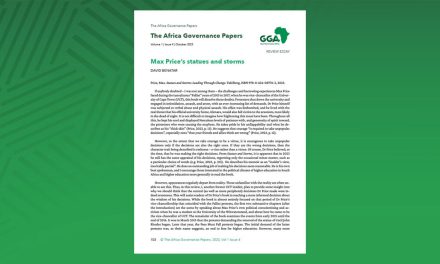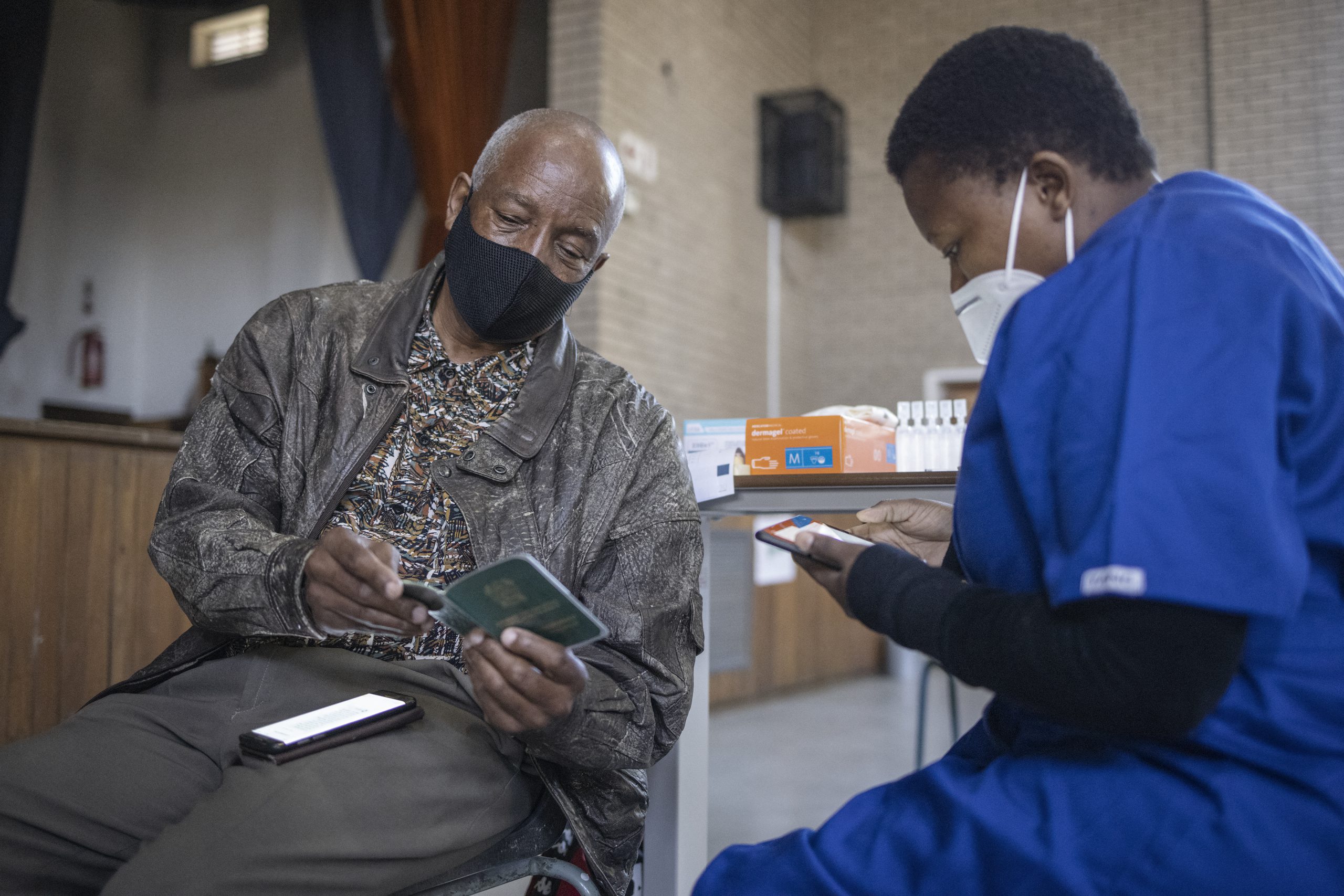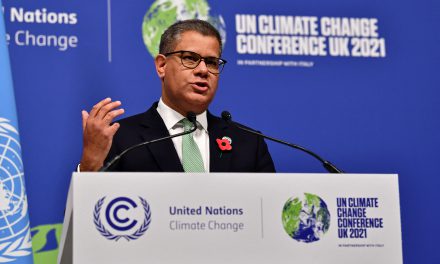Coalition politics has gained salience in the public imagination in recent months following disunity and breakdown in several local councils, including the high-profile metros of Johannesburg and Tshwane. In response to this crisis, Good Governance Africa has called on President Ramaphosa and his cabinet to convene an independent panel.
This panel should assess the current limitations of coalitions in South Africa to strengthen their effectiveness. By suggesting a suitable combination of remedies which the government, political parties and civic society then act upon, the panel can help create a pathway toward a stabler system capable of delivering for citizens.

Murunwa Makwarela, representing the Congress of the People, was elected Tshwane’s new mayor in February after a multi-party coalition plan to elect a DA candidate failed. Photo: Tshwane.gov.za
Coalitions in South Africa
Coalitions form when no single political party gains a majority of seats on an elected council. This creates a “hung council”, meaning that parties have to govern together.
Multiparty politics is inevitable at the national, provincial and local levels in South Africa. In 2016, there were 27 hung local councils. Currently, there are more than 80. From 2024 Gauteng and KwaZulu-Natal (KZN) – which together comprise 45.6% of South Africa’s population – will likely have multiparty governments.
The inevitability of multiparty politics makes the recent instability concerning. Municipalities in several provinces including Gauteng, KZN and the Western Cape are affected. Johannesburg alone has gone through six distinct periods of municipal administration since November 2019.
This negatively impacted governance: political instability rose, decision-making slowed, uncertainty among municipal officials increased, accountability blurred and basic service delivery suffered.
The result is that public trust in multiparty politics erodes while this politics becomes commonplace. Intervention is required, but it is challenging to regulate a political process like coalition formation.
Two components which enhance coalition effectiveness are a conducive political culture emphasizing interparty cooperation, and an institutional framework that augments stability and transparency. Their absence at the local level has left coalition politics at the mercy of the short-term interests of parties.
Before the 2021 local elections, organisations including the South African Local Government Association (working with the Dullah Omar Institute), as well as the Mapungubwe Institute for Strategic Reflection produced work on how South Africa might resolve this quandary.
Key recommendations they provided included increasing the timeframe within which leadership councils are obliged to form, publishing coalition agreements, setting up dispute resolution mechanisms and protecting basic administration from political bartering.
In the 15 months since that election, political parties have shown little desire to establish these norms of their own accord, to corrosive effect. This has convinced us that external prompting in the form of a presidentially-mandated independent panel on coalitions can facilitate the process.
The case for an independent expert panel
The President is constitutionally empowered in section 84(2)(f) to appoint commissions of inquiry. This includes the power to establish expert advisory committees/panels to investigate specific policy matters. The decision to establish the panel, as well as the mandate and composition of the panel, must be rational.
The possibility of coalitions at all levels of government is a complex and controversial issue. It compels an analysis of our regulatory frameworks applicable to coalition oversight and accountability mechanisms.
2024 will be the first time that our democracy faces the realistic prospect of a national coalition government since the Government of National Unity (GNU) from 1994-1999. The GNU was hampered by political infighting. Upon its formation, the New York Times described the cabinet as “an eclectic, even explosive, mix of personalities, backgrounds and styles that will challenge Mr Mandela’s promise to govern by consensus.”
Party dissonance in our current political climate is not much less inflammatory. National and provincial coalitions post-2024 would similarly be alliances of conflicting ideologies formed out of necessity, rather than a genuine desire to work together.
Thus, an expert panel can help ensure a national coalition government would operate more effectively than it has in the past, and in such a way that it promotes our founding constitutional values of accountability, responsiveness and openness.
Proportionate electoral systems, like South Africa’s, tend to produce more coalition governments than majoritarian systems. Neither our Constitution nor any legislation contains specific provisions regulating the formation of coalition governments at the local, provincial or national level, though this is not unique.
For example, coalition governments are also a common feature in Germany, yet there is no specific law in Germany’s Constitution or legislation that provides a specific regulatory framework for coalition agreements or governance. The framework is typically decided by negotiations between the political parties involved.
However, Germany’s political culture is underscored by a greater willingness by parties to act in a cooperative way. The wealth of research produced here and abroad on this topic has not gained enough traction among parties despite South Africa entering an era defined by coalition politics.
This necessitates the convening of an independent panel empowered to examine the issue and provide recommendations. The panel’s appointment will grant legitimacy to South Africa’s shifting political landscape and help identify how our existing democratic institutions can adapt.
There is precedent in South Africa for independent panels considering matters relevant to political issues, especially on electoral reform. Most notable was the Van Zyl Slabbert Commission on Electoral Reform – an advisory Electoral Task Team established by Cabinet in 2002. Independent Panel Assessments of Parliament published in 2006 and 2017, also considered the issue of electoral reform – though their recommendations were never implemented.
This does not mean that an independent panel on coalitions would be useless. The Van Zyl Slabbert report generated significant discussion on the issue of electoral reform, particularly over the recent electoral amendment bill. Moreover, it and the subsequent reports, did not directly consider a situation where coalitions were commonplace at all levels of government.
At that time, the political context did not compel a change in the electoral system. Now, the looming likelihood of a national coalition government can lead to a more serious consideration of an expert panel’s recommendations, by Parliament and party leaders alike.
This is needed in a democracy plagued by political dissonance and accountability problems. There is already expansive research, based on data from other jurisdictions, analysing the effectiveness of parliamentary oversight bodies and judicial dispute resolution mechanisms in coalition-led states.
We already have many of these democratic accountability mechanisms in place, so it is a question of using them more effectively in coalition scenarios.
Uniquely, a panel can publish its findings in an accessible way. Therefore, it will inform the public on how and why they can hold a coalition government accountable, giving other sectors of society more of a voice on this significant issue.
This panel’s recommendations should act as guidelines or inform the creation of high-level regulatory frameworks for political parties forming coalition governments. Proposing new legislation to extensively micro-manage coalition agreements and functioning would constitute an intrusion of the legislative branch into the executive branch of government, contrary to the separation of powers principle.
Coalition formation and governance is a multifaceted political issue which needs to be flexible and adaptable to context – a domain in which the executive is most experienced.
In this new era of coalition politics, there needs to be a healthy balance between legal and institutional frameworks encouraging a stable, accountable, and transparent leadership, and freedom for parties to take the reins in what is largely a political domain.
Democracy rests equally on institutions and on the confidence that citizens have in those institutions. Currently, trust in coalitions is low due to instability at the local level.
A weary citizenry might think appointing an independent panel is stalling. The alternative is to leave solutions entirely up to political parties themselves, with no meaningful external input and no time frame for change.
A version of this article also appears in the Mail & Guardian













